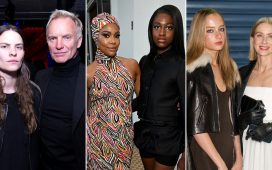Had Wednesday night’s debate gone according to plan, it would have revolved around Elizabeth Warren, the only top-tier candidate onstage. But the news kept intruding—and so did President Trump. At a curving white performing-arts center, in downtown Miami, the Democratic National Committee’s beleaguered chairman, Tom Perez, spoke to the crowd before the cameras came on. He mentioned the photo on the front page of the New York Times that morning, of a Salvadoran father named Óscar Alberto Martínez Ramírez and his toddler daughter, Angie Valeria, dead in the Rio Grande. During the debate, the candidates would return to the image several times: it clarified the stakes of the race, but it also seemed to destabilize any plans for the evening.
Once Perez departed and the house lights dimmed, and Beto O’Rourke gave a final sweep of his finger to organize his hair, Warren was center-stage—wearing a plum jacket and rimless eyeglasses, with her spine angled forward—and took the first question, about whether her message of inequality was misplaced at a moment when most Americans and even most Democrats were optimistic about the economy. She bore down on the message that has defined her career—that there is “corruption” in a system that favors the powerful over ordinary Americans, that in the effort to level the playing field “what’s been missing is courage.” The moderators tried to prod more centrist candidates to break with her, but they didn’t seem willing to do so. “I don’t think I disagree,” Cory Booker said. Warren got the first question, and the fourth. The Party is moving to the left, as everyone has been saying since 2016, and the first few minutes of the debate allowed you to measure how far: Warren, who not long ago defined the progressive frontier, now seemed at the center.
Warren’s improvement in the polls has been the story of the Democratic primary this spring. It has been accompanied by a subtle turn in Warren’s message. Most Democrats knew Warren as a populist, as a student of bankruptcy and debt who, in her work on the Consumer Financial Protection Bureau and as an outspoken senator from Massachusetts, stood up to the financial industry on behalf of ordinary people. Her campaign began with an effort to root that character deep in her biography, with a stump speech that emphasized the frayed financial circumstances of her upbringing in Oklahoma and portrayed her own battles with the big banks as resembling a comeuppance, if not revenge. That pitch got less traction than you might have expected. In the past few months, Warren has worked to emphasize different points, saying less about her own biography while releasing policy proposals with the constancy of a blizzard. When Time magazine put her on its cover, the slogan was “I’ve got a plan for that.” Something clicked—maybe the natural appeal of rebuking an ignorant President with a barrage of footnotes, maybe the realization that, despite some fears to the contrary, Warren wasn’t at all like Hillary Clinton. Before the debate, many campaigns were declaring that their candidates were looking forward to “introducing” themselves to voters, but Warren’s public persona had already been clarified: the expert in the field, Professor Warren of Cambridge, zip code 02138.
That persona suited the early phase of the Presidential campaign, which has had a slightly airless, theoretical quality. At mostly small-town events, candidates have been asked about their preferred method of achieving universal health coverage, or about how they would achieve free college, as if the President were starting a society from scratch. But this week, as the candidates arrived in Florida, the mood darkened, colored by the news. Jay Inslee surveyed environmental destruction in the Everglades. Amy Klobuchar and Warren took in the vast child-migrant detention facility at Homestead. And as the debate went on, the moral outrage sharpened. Julian Castro made his case to decriminalize migration, and for a “Marshall Plan” for the crisis-stricken countries of Central America. Cory Booker pointed out that there are “more African-Americans under criminal supervision than all the slaves in 1850.” Jay Inslee said that the U.S. has one generation to stave off the most harmful consequences of climate change, and insisted the issue was so pressing that it was necessary “to take the filibuster away from Mitch McConnell.” Beto O’Rourke, seemingly at random, got a question about whether the United States ought to honor a responsibility to protect people threatened by genocide overseas.
The question for the Democratic Party now isn’t how far left it has moved. It is whether the problem it sees is what Warren called “the structural change in our government and our economy”—the swelling imbalance between rich and poor—or whether it is Donald Trump. Warren has been the phenomenon of the election so far because of the scope of her expertise and the lucidity of her message of inequality and corruption. But a collective, moral case against Trump began to assemble onstage, on Wednesday night. The talk about criminal justice, climate change, and immigration was about the way that Trump privileges the lives of some Americans above all others. But no single candidate really made the case—perhaps, in the long year until the Democratic Convention, someone will—and so the image of Ramírez and his daughter hung over the event but did not, in the end, define it. At one point, Warren was asked if she had a plan for Mitch McConnell. “I do,” she said evenly, drawing laughs and applause. But it was the wrong question. The right one, unanswered, was whether she had a plan for Trump.








